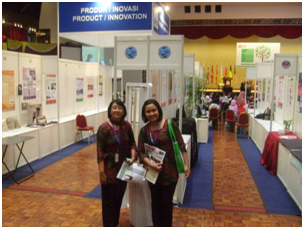Bringing biosecurity and food security to community developers in five Continents
Eka Martiningsih and Gung Sri Jayantini have been researchers on the Cooperative Research Centre for National Plant Biosecurity (CRCNPB) research project on community management of biosecurity. This project is a collaborative venture between Indonesia and Australia, and Eka and Sri are researching some Indonesian aspects of the project.
Professor Ian Falk (Charles Darwin University) is the project leader, while there are a number of partner institutions such as the University of Satya Wacana (UKSW) in Central Java, Nusa Cendana University (Undana) in West Timor and Mahasaraswati University (Unmas) in Denpasar Bali, where Eka and Sri work as lecturers.
In 2010, as a result of this research, Eka and Sri had a great opportunity to travel abroad to Malaysia, to attend the International Conference on Sustainable Community Development (ICOSCD) held at the University of Putra Malaysia (UPM) in Selangor, Malaysia.
While the CRCNPB supported the research itself, the travel to Malaysia was supported by the Directorate General of Higher Education (DIKTI) in Jakarta. In Malaysia Eka and Sri presented a paper related to the research field of biosecurity and community development, which focused on gender issues.
The conference’s main theme was Harnessing Human and Social Capital Growth Towards Community Regeneration. Eka and Sri reflected this theme in a paper entitled Gender and Cultural Issues in Biosecurity and Food Security Management, Local Knowledge Practices in Bali Province. The co-author, Gung Sri, had just finished her Masters of Linguistics at Udayana University (Bali) concerning scientific translation in biosecurity issues and has also been a member of the CRC’s cooperative research in Indonesia from its inception as the project’s translator.
Organised by the Institute for Social Science Studies (IPSAS) at the University of Putra Malaysia (UPM), Eka and Sri also found the rest of the conference interesting. Various ideas were shared by the researchers from all over the world.
The participants were representatives of five continents: Asia, Europe, Australia, America and Africa, who sat together talking about the challenges and future of community development in their countries. In that way, the conference offered a good opportunity for the participants to talk to each other about their community empowerment and development programs which were linked with agricultural issues, cultural diversity as well as the research that they conducted on human and social capital development and the challenges of sustainable community development, education and services.
Bringing biosecurity issues to ICOSCD 2010 was a wonderful experience, partly because the issue of biosecurity was, in fact, part of community life. People could not be separated from their environment in which the issue of biosecurity existed impacting directly on the quality of food that they ate. In addition, it was really interesting to link the issue of biosecurity and food security with sustainable community development programs in an international conference like ICOSCD 2010.

Eka and Sri at a poster paper presentation.

